Idaho Criminal Background Checks: Process, Importance, and Legal Considerations
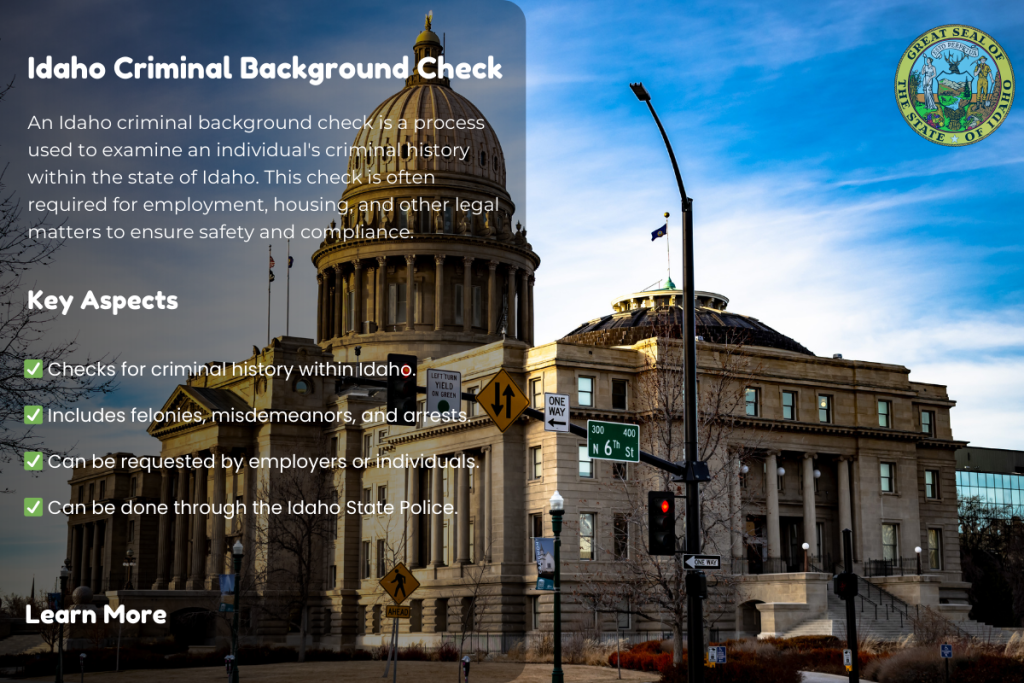
What Is an Idaho Criminal Background Check?
A criminal background check in Idaho is a process through which an individual’s criminal history is investigated to gather pertinent information regarding their past arrests, convictions, and other legal matters. This check is usually requested by employers, landlords, or government agencies to assess an individual’s suitability for employment, housing, or certain licenses. An Idaho criminal background check can reveal records of felonies, misdemeanors, arrests, and even traffic violations, helping entities make informed decisions based on an individual’s criminal history.
In Idaho, criminal background checks are particularly important because they provide insight into the legal history of individuals within the state. This allows employers to maintain a safe and trustworthy workforce, landlords to ensure the security of their properties, and government bodies to comply with regulations. The check includes various types of criminal records, which can vary depending on the type of check being conducted (e.g., state-level check, county-specific, or FBI-level check).
Importance of Criminal Background Checks in Idaho
Criminal background checks in Idaho serve several vital purposes, particularly for employers, landlords, and anyone involved in making important decisions about individuals in their community. These checks help mitigate potential risks and ensure safety, fostering trust in both professional and personal relationships.
For employers, criminal background checks are essential in identifying potential risks posed by employees or applicants, especially when the position involves handling sensitive information, financial matters, or the safety of others. By verifying a candidate’s criminal record, employers reduce the chances of hiring someone with a history that could put the workplace or company at risk.
For landlords, a criminal background check is a way to evaluate whether a prospective tenant poses a potential danger to the community or the property. Renting to individuals with a criminal history could expose landlords to legal issues or riskier situations. Therefore, conducting a thorough background check can help landlords maintain a safe living environment for other tenants.
Government agencies also use criminal background checks to ensure that the people they employ or work with are trustworthy and law-abiding. For example, law enforcement agencies and educational institutions often require background checks to verify the suitability of applicants. Additionally, various public service organizations and nonprofits also rely on these checks when screening volunteers or staff.
Types of Criminal Background Checks in Idaho
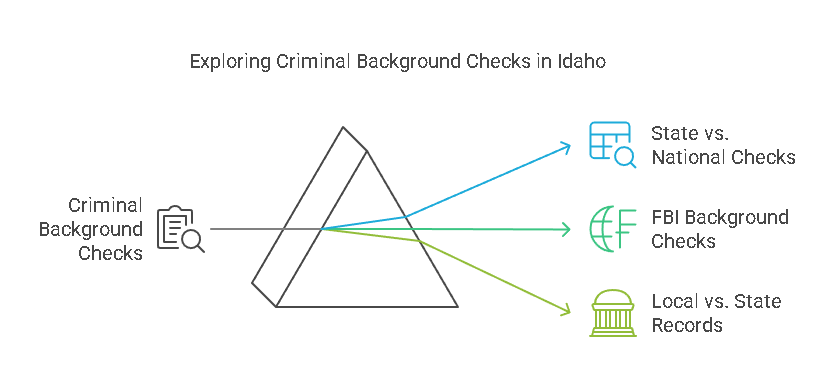
- State vs. National Checks
One of the primary distinctions when it comes to criminal background checks is whether the check is performed at the state or federal level. A state criminal background check in Idaho will look specifically at records within the state of Idaho. These checks are typically conducted by the Idaho State Police, and they provide information on crimes committed within the state. On the other hand, national criminal background checks typically involve information gathered from federal databases like the FBI.When performing an Idaho criminal background check, it’s important to understand the difference between these two types. A state-level check can provide a more localized and specific account of a person’s criminal history in Idaho, whereas a national check offers a broader view of criminal activity, including records from other states. - FBI Background Checks
An FBI background check, which includes nationwide data, is usually required when federal agencies or national organizations request background information. While an Idaho state check only includes criminal activity within Idaho, an FBI check will include nationwide criminal history and can offer insights into criminal records outside of the state. This is especially important for employers and organizations that operate on a national level or have strict legal requirements regarding criminal history. - Local vs. State Records
There are also distinctions between local (county) records and state records. While the state check includes information from the Idaho State Police, local checks are done by county or city law enforcement agencies and will provide records of crimes and arrests that occurred within that particular jurisdiction. For example, someone might have a clean record at the state level but might have a misdemeanor conviction in a local county jurisdiction.
Who Needs a Criminal Background Check in Idaho?
- Employers
Employers in Idaho are among the most common requesters of criminal background checks. Criminal checks help them make informed decisions about potential hires and minimize risk. Businesses in sensitive fields such as finance, healthcare, education, and transportation often require background checks due to the nature of the roles and the vulnerability of the individuals they serve.Employers are not required by law to perform background checks on all employees, but many do so as part of their hiring process. This helps them maintain a secure and trustworthy workplace environment. It is important for employers to be aware of federal and state laws governing the use of criminal records in hiring decisions, ensuring they comply with the Equal Employment Opportunity Commission (EEOC) and other regulations. - Landlords
Landlords also commonly request criminal background checks when screening potential tenants. This helps landlords assess the risk of renting their property to individuals who might pose a threat to the safety and security of the building or other tenants. In Idaho, landlords are permitted to use criminal history as part of the tenant screening process, though there are legal boundaries. For example, landlords cannot automatically disqualify applicants based solely on a criminal record without considering the nature of the offense and how long ago it occurred. - Government Agencies and Public Services
Government agencies in Idaho may request background checks on individuals applying for certain licenses, certifications, or positions. These checks help ensure that people involved in public services, law enforcement, education, or other regulated sectors do not have criminal backgrounds that might pose a risk to public safety or violate regulatory standards.
How Criminal Background Checks Are Conducted in Idaho
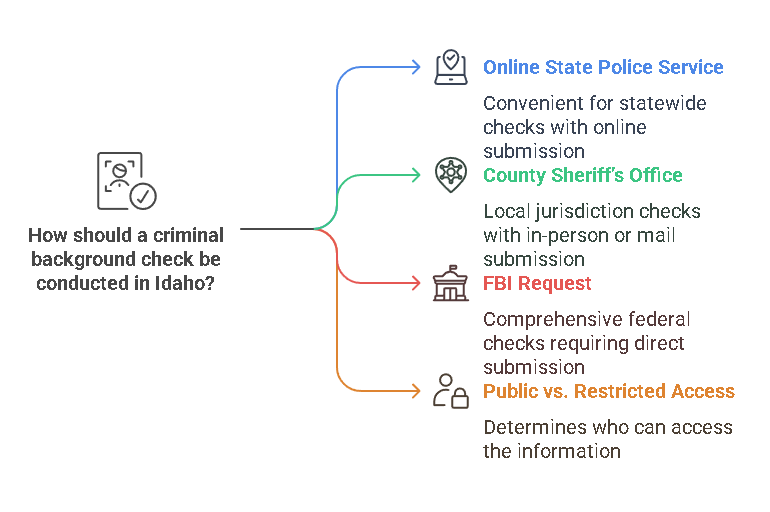
Individuals or organizations looking to request a criminal background check in Idaho can do so through several different methods. The Idaho State Police offers an online service through which individuals and businesses can request criminal history reports. The process typically requires the completion of forms and may involve the submission of fingerprints for identification verification. Requesters will need to provide certain personal information, such as full name, date of birth, and address.
Additionally, Idaho residents can obtain a criminal record check from the local county sheriff’s office. For more detailed records, including FBI-level checks, individuals or organizations must submit requests directly to the FBI. Depending on the type of check, fees, and processing times may vary.
Public Access vs. Restricted Access
Criminal background check information is generally divided into two categories: public records and restricted records. Public records can be accessed by anyone, while restricted records require permission for release. Access to certain criminal records, such as sealed or expunged information, is typically restricted to specific individuals or organizations, such as law enforcement or government officials.
Statewide vs. County-Specific Records
Statewide records provide a broader view of an individual’s criminal history, including all felonies and misdemeanors committed across Idaho. County-specific checks are narrower and focus only on criminal activity within a specific jurisdiction. For instance, if an individual has committed a crime in a particular county but not statewide, a county check would reveal this information while a state check might not.
How to Conduct an Idaho Criminal Background Check, Best Practices, and Services
Conducting an Idaho criminal background check involves several key steps, whether you’re an individual looking to check your own background or an employer, landlord, or government agency requesting a check on someone else. Here’s a step-by-step guide to ensure a smooth and efficient process:
1. Requesting Through Idaho State Police
The Idaho State Police provides a streamlined process for obtaining criminal background checks within the state. This can be done through the Idaho State Police Bureau of Criminal Identification (BCI), which maintains statewide criminal history records. To request a criminal background check from the Idaho State Police, you must:
- Complete the Required Form: Fill out the Criminal History Record Request form available on the Idaho State Police website.
- Provide Personal Information: Include the subject’s full name, date of birth, gender, and address, as well as any other identifying information such as social security number.
- Submit Fingerprints: Fingerprints are often required to verify the identity of the individual for an accurate background check. This can be done at an authorized fingerprinting location.
- Pay the Fee: A fee is associated with the background check request, and the cost can vary depending on the type of request and whether it is for personal or employment purposes.
Once your request is processed, you will receive the criminal history report that includes any felony or misdemeanor convictions in Idaho.
2. Using Online Services
Online services have made the process of conducting an Idaho criminal background check quicker and more convenient. Many websites provide access to criminal records either through state or third-party sources. These services are useful for individuals and businesses that require fast access to criminal background information.
When using an online service, keep in mind that some platforms are more reliable than others. It’s crucial to ensure that the online service you’re using is legitimate and that it complies with state and federal laws regarding the release of criminal records. Precisehire is an example of a trusted platform that streamlines background check processes for employers and organizations, ensuring compliance and accuracy.
3. Accessing County and Municipal Records
In addition to state-level criminal checks, you may need to request background checks from local law enforcement agencies, such as county sheriff’s offices or municipal police departments. This is especially important when you need information about crimes that might not be included in the state records, such as certain misdemeanors or offenses that were handled at the local level.
To request county or municipal records:
- Contact the Local Sheriff’s Office or Police Department: Visit the relevant agency’s website or contact them directly to inquire about the process for obtaining criminal records.
- Provide the Required Information: Just like with state records, you will need to provide personal identifying information, and in some cases, fingerprints may also be required.
- Submit a Request Form: Many local agencies will require a specific form to be filled out, and some may charge a fee for processing your request.
County-specific criminal background checks offer detailed information on local offenses and can be especially important when hiring for jobs that involve sensitive or local-level responsibilities.
4. Required Documentation
When requesting a criminal background check in Idaho, certain documents and personal information are needed to process your request efficiently. Generally, the following documents or details are required:
- Full Name: The subject’s legal name, including any aliases.
- Date of Birth: This helps to verify the correct individual and ensures accurate results.
- Social Security Number (optional but recommended): It can help avoid confusion with similarly named individuals.
- Fingerprints: For fingerprint-based background checks, such as those required by the FBI or certain employers.
- Proof of Identity: Some checks may require a valid government-issued ID, such as a driver’s license or passport.
Make sure you gather all necessary documentation to avoid delays and ensure that the criminal background check is processed efficiently.
Best Practices for Employers and Landlords in Idaho
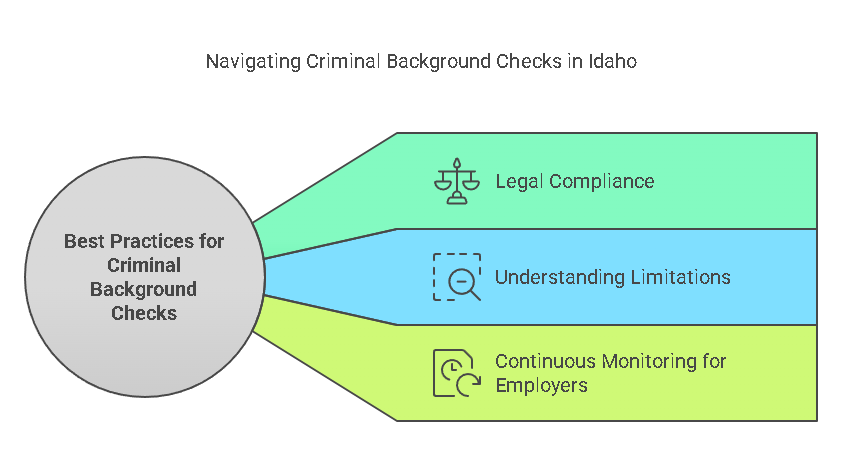
Conducting criminal background checks requires employers and landlords to adhere to best practices to ensure compliance with the law, protect privacy, and make informed decisions. Below are several important guidelines:
1. Ensuring Legal Compliance
Employers and landlords must comply with various laws and regulations when using criminal background checks. Key regulations to keep in mind include:
- Fair Credit Reporting Act (FCRA): The FCRA governs how background check information can be used, ensuring that individuals are informed about the check and granting them the opportunity to dispute inaccurate information.
- Equal Employment Opportunity Commission (EEOC) Guidelines: The EEOC enforces laws against discrimination, including discrimination based on criminal history. Employers must be cautious about using criminal records in hiring decisions and should consider factors such as the nature of the crime, how long ago it occurred, and whether it is relevant to the job in question.
- Idaho-specific laws: Idaho laws may dictate how criminal background check information can be used, especially in tenant screening and hiring. Employers should familiarize themselves with local regulations to ensure they are not violating any state-specific restrictions.
2. Understanding the Limitations of Criminal Background Checks
While criminal background checks are valuable tools, they have limitations. Criminal records can sometimes be inaccurate, incomplete, or outdated. In addition, not all crimes may appear on a background check. Here are some important limitations to keep in mind:
- Expunged or Sealed Records: Expunged or sealed records will not appear on criminal background checks. It is important for employers and landlords to understand that an applicant or tenant may not have to disclose these records.
- Incomplete Records: Some offenses, especially minor infractions, may not appear in all jurisdictions or databases. It’s also possible for records to be missing or incorrectly reported.
- Overreliance on Criminal Checks: Criminal background checks should be one part of a broader hiring or screening process. Employers and landlords should not rely solely on criminal history to make final decisions. It’s important to consider other factors like references, qualifications, and the candidate’s overall behavior.
3. Continuous Monitoring for Employers
For employers in Idaho, it is vital to ensure ongoing compliance with state and federal regulations regarding employee background checks. This means performing regular checks on current employees, especially if they hold sensitive positions or work in industries with high regulatory requirements.
Regular background checks can help detect any new criminal activity or violations that may impact the individual’s job performance or trustworthiness. Employers should consider setting up periodic background checks or continuous monitoring services to stay informed.
Precisehire’s Role in Idaho Criminal Background Checks
Precisehire provides comprehensive services to assist employers, landlords, and other organizations with conducting criminal background checks in Idaho. Here’s how Precisehire can help streamline the process:
Precisehire Services
Precisehire offers a user-friendly platform for requesting and receiving accurate criminal background checks. The service provides:
- Access to State and National Databases: Employers can easily access both Idaho-specific and nationwide criminal records.
- Fast Turnaround Times: Precisehire’s system ensures quick results, allowing businesses to make timely decisions during the hiring or tenant screening process.
- Compliance Assurance: With Precisehire, employers can ensure that their background checks adhere to all legal regulations, including FCRA and EEOC requirements.
Automated and Streamlined Processes
Precisehire simplifies the background check process by automating many of the steps involved. The platform offers secure and convenient access to criminal record databases, significantly reducing the administrative overhead of background checks. Employers can request multiple checks at once and easily store records for future reference.
Compliant and Thorough Checks
Precisehire helps employers and landlords maintain compliance with both Idaho state laws and federal regulations. This ensures that the criminal background check process remains fair, legal, and non-discriminatory.
Legal Considerations for Idaho Criminal Background Checks
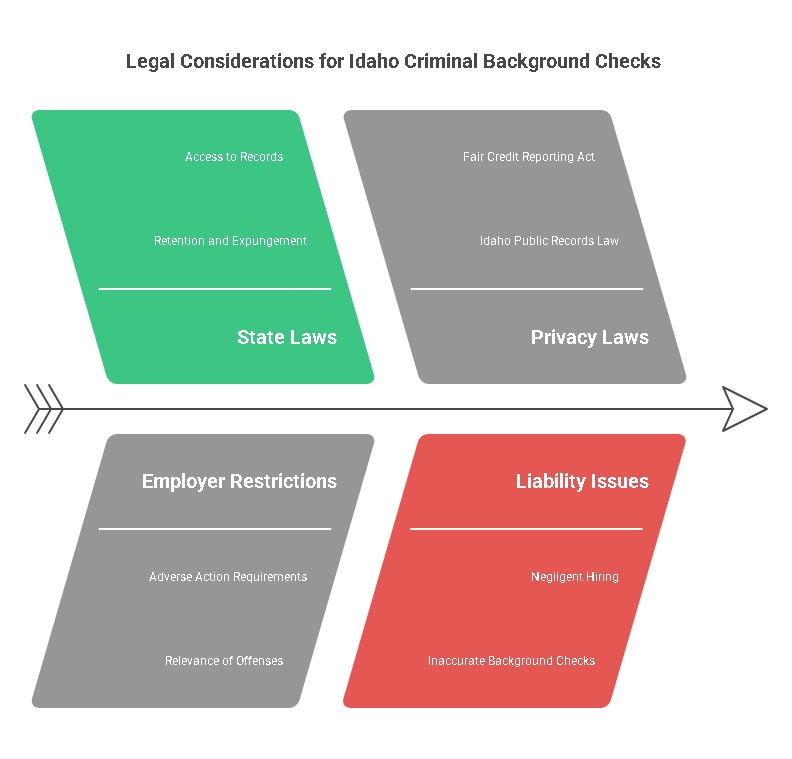
When conducting criminal background checks in Idaho, both individuals and organizations must be aware of the legal aspects governing how background check information can be used, retained, and shared. Below are some important legal considerations to keep in mind:
1. State Laws on Background Checks
Idaho has specific laws that govern the use and dissemination of criminal background check information. Some important aspects of Idaho law include:
- Retention of Criminal Records: In Idaho, criminal records are typically maintained indefinitely unless they are sealed or expunged. Felony convictions are more likely to remain on record for life, whereas misdemeanor convictions may be expunged or sealed under certain conditions.
- Expungement: Expungement is the legal process by which certain criminal records are sealed or erased. Individuals who have committed minor offenses or who have completed a rehabilitation program may be eligible to have their records expunged, making them inaccessible to most employers or landlords. However, some criminal offenses, such as violent felonies, cannot be expunged under Idaho law.
- Access to Records: In Idaho, criminal background checks are typically available to employers, landlords, and other agencies for a legitimate purpose. However, public access to criminal records is often limited, especially for records that are sealed or expunged. Employers and others using criminal background checks should ensure that they are accessing information through the appropriate channels and in compliance with privacy laws.
2. Employer Restrictions
In Idaho, employers are subject to specific restrictions when it comes to considering criminal records during the hiring process. These include:
- Adverse Action: Under the Fair Credit Reporting Act (FCRA), employers must notify applicants if they are taking adverse action based on the results of a criminal background check. This notification must be made before the decision is finalized, and the applicant must be given an opportunity to dispute any inaccuracies in the record.
- Relevance of Offenses: Idaho law prohibits employers from considering criminal offenses that are not relevant to the job being applied for. For example, a DUI offense may not be relevant for an office job, but it could be relevant for a driving position. Employers must ensure that criminal history is considered only when it directly relates to the duties and responsibilities of the position.
- Waiting Periods: Some employers are required to wait a certain amount of time after a conviction before considering it in their hiring decisions. This is typically the case with certain types of offenses that may not be directly relevant to the position or industry.
3. Privacy Laws
Handling criminal background check information is subject to strict privacy laws in Idaho. Information about a person’s criminal history is considered sensitive data, and there are regulations in place to protect this information. The primary laws governing the privacy of criminal background checks in Idaho include:
- The Idaho Public Records Law: This law governs the public’s right to access government records, including criminal records. However, not all criminal records are open to the public, especially those that are sealed or expunged.
- The Fair Credit Reporting Act (FCRA): The FCRA applies to background checks used by employers and ensures that individuals’ personal information is handled securely and appropriately. It requires that consumers be notified if an adverse action is taken based on the results of a background check and that they be given a chance to dispute any inaccuracies in the report.
- Confidentiality Agreements: Employers and landlords should take care to store and protect criminal background check records securely. Confidentiality agreements should be in place to prevent unauthorized access to sensitive information.
4. Liability Issues
Employers and others who conduct criminal background checks in Idaho must be mindful of potential liability issues. Failing to follow proper procedures can lead to legal consequences, including lawsuits and fines. Some key liability concerns include:
- Negligent Hiring: If an employer hires an individual without conducting an appropriate criminal background check, they may be held liable if the individual commits a crime or causes harm in the workplace. For instance, hiring someone with a known violent criminal history for a sensitive position without proper screening can lead to significant legal repercussions.
- Inaccurate or Incomplete Background Checks: Employers who rely on incomplete or inaccurate background check information may be liable for making incorrect hiring decisions. It’s important for employers to ensure that the information they are using is up to date and correct. Using services like Precisehire can help ensure that criminal records are complete and accurate, reducing the risk of liability.
Frequently Asked Questions (FAQs)
How Long Does an Idaho Criminal Background Check Take?
The length of time it takes to complete an Idaho criminal background check can vary. Requests through the Idaho State Police generally take several business days to process, although the exact time frame depends on the volume of requests. Online services may provide faster results, sometimes in as little as 24 hours, depending on the type of check requested.
What Types of Criminal Offenses Show Up on an Idaho Criminal Background Check?
An Idaho criminal background check typically includes information on felony and misdemeanor convictions, arrest history, and pending charges. It may also show any warrants or protective orders issued against the individual. However, some records may be expunged or sealed, and these will not appear on a background check.
Are There Any Limitations on What Employers Can See on an Idaho Criminal Background Check?
Yes, employers in Idaho are limited in what they can consider when conducting a criminal background check. They cannot use certain types of offenses (e.g., expunged or sealed records) or irrelevant offenses to make hiring decisions. Additionally, employers must follow the guidelines set forth by the EEOC and FCRA to ensure that criminal history is not used in a discriminatory manner.
How Can Someone Challenge or Dispute an Idaho Criminal Background Check?
If an individual believes there is an error in their Idaho criminal background check, they can challenge or dispute the information by contacting the agency that provided the report. This could be the Idaho State Police or a third-party service. They may need to provide documentation, such as proof of expungement, to correct the record.
How Far Back Do Criminal Background Checks in Idaho Go?
Idaho criminal background checks typically go back seven years, in line with federal regulations. However, certain serious offenses, like felonies, may be included on a background check regardless of when they occurred. Some employers may choose to check records that go further back, especially if the position involves sensitive responsibilities.
Conclusion
In conclusion, conducting criminal background checks in Idaho is essential for maintaining safety, security, and trust in various sectors, including employment and housing. Whether you are an employer, landlord, or individual looking to verify someone’s criminal history, it is important to follow the proper legal processes to ensure accuracy and compliance.
By leveraging trusted services like Precisehire, employers and organizations can streamline the process of conducting criminal background checks, ensuring they adhere to both state and federal regulations. Accurate background checks help protect individuals and businesses from potential liabilities and risks, fostering a safer and more reliable environment for all.
As you consider your options for criminal background checks in Idaho, remember to take into account the legal guidelines, privacy laws, and best practices to make informed decisions and maintain compliance with the law.
